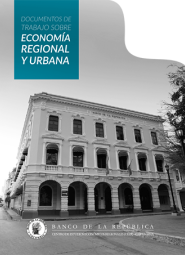Enrollment and Quality Levels of Colombia's Public Basic Education: Has Fiscal Decentralization Improved Them?
La serie Borradores de Economía es una publicación de la Subgerencia de Estudios Económicos del Banco de la República. Los trabajos son de carácter provisional, las opiniones y posibles errores son responsabilidad exclusiva del autor y sus contenidos no comprometen al Banco de la República ni a su Junta Directiva.
This paper provides empirical evidence of the impact of fiscal decentralization on Colombia's public basic education. Based on the social and economic data available for 1,003 municipalities and 13,670 public schools, for the last decade, we confirmed that decentralization has had a positive and non-monotone effect on education enrollment. Likewise, our results suggest that it has had a positive impact on quality, once several variables, commonly used to explain performance differences, were controlled. Assuming that the effects of decentralization might have been uneven between regions and within them, we specified panel data and cross section econometric models for all municipalities as a whole, for size-based municipal categories, and for the towns which receive education funding directly from the central government or not.
Documento actualizado a las 10:15 a.m. del 02/07/2013


















































